Module 2 Experiences.Unit 3 Language in use 课件 (4)(共14张PPT)
文档属性
| 名称 | Module 2 Experiences.Unit 3 Language in use 课件 (4)(共14张PPT) | 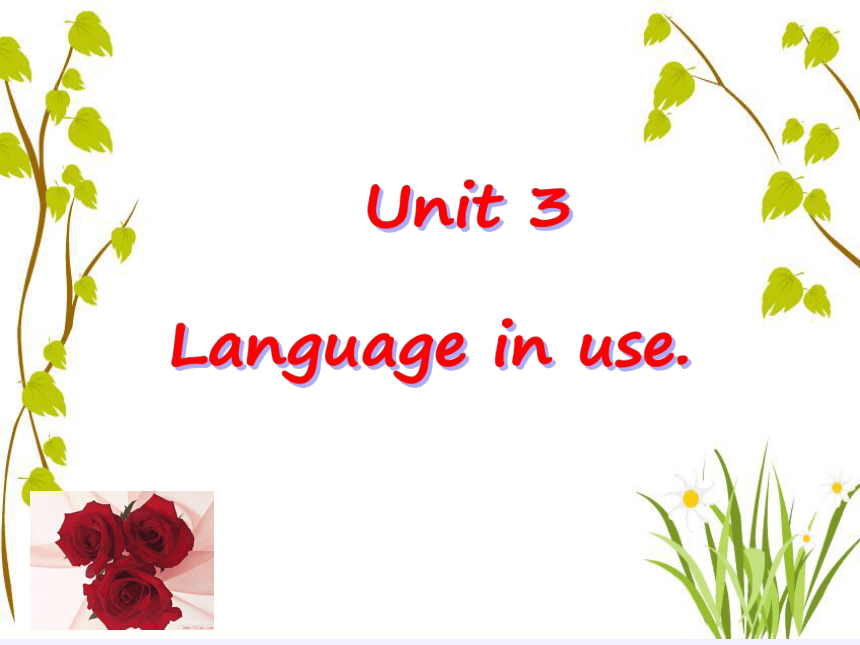 | |
| 格式 | ppt | ||
| 文件大小 | 834.5KB | ||
| 资源类型 | 教案 | ||
| 版本资源 | 外研版 | ||
| 科目 | 英语 | ||
| 更新时间 | 2022-07-13 12:23:52 | ||
图片预览

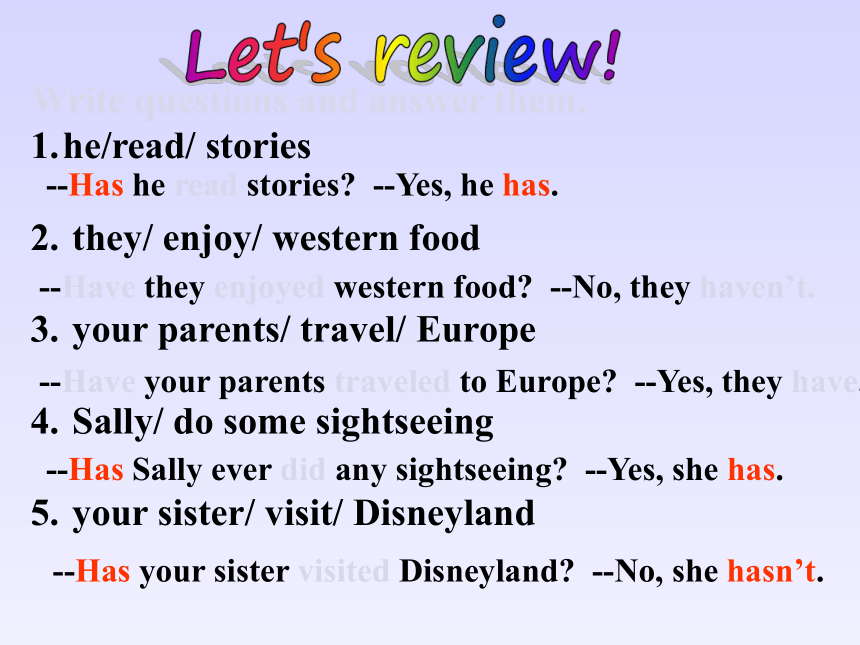

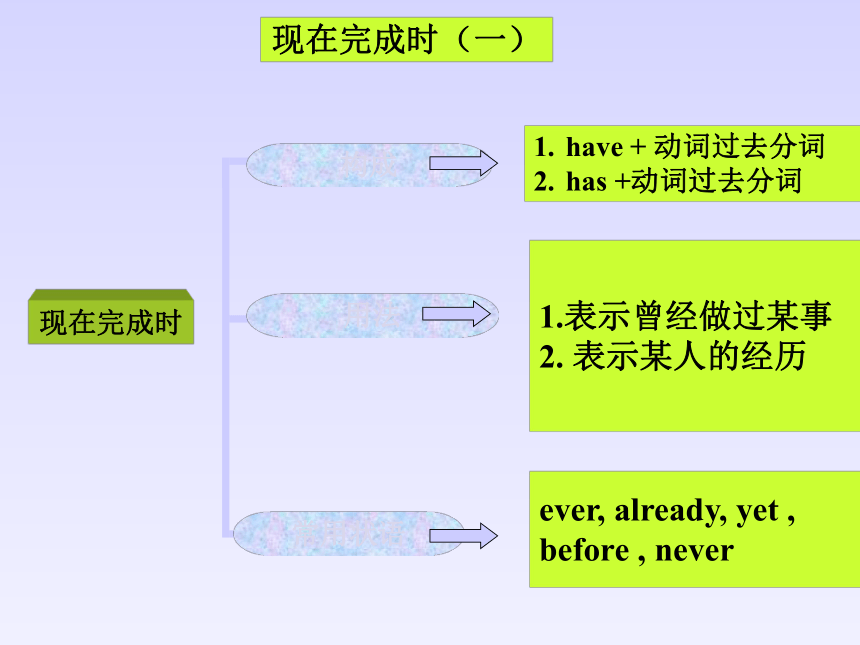
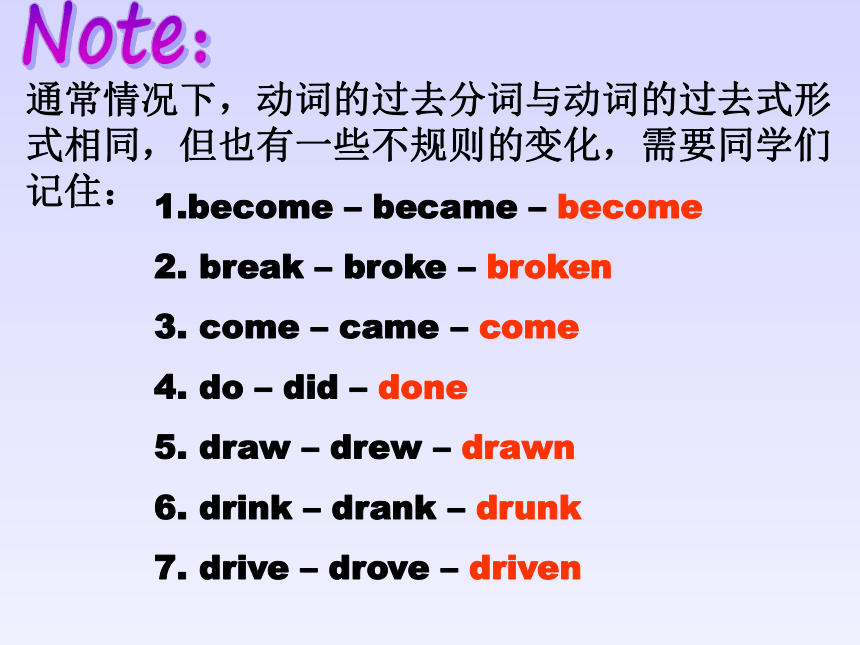
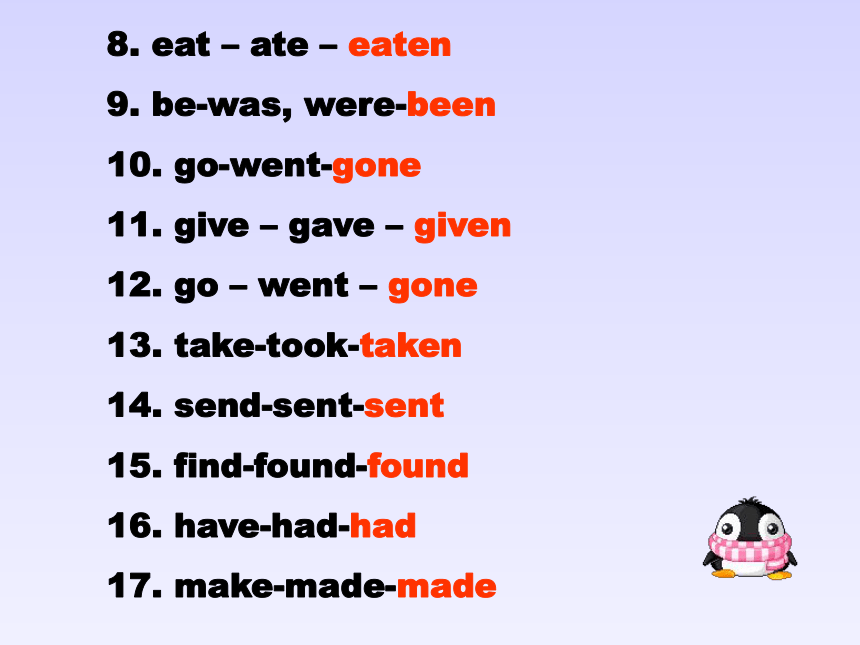

文档简介
(共14张PPT)
Write questions and answer them.
he/read/ stories
they/ enjoy/ western food
your parents/ travel/ Europe
Sally/ do some sightseeing
your sister/ visit/ Disneyland
--Has he read stories --Yes, he has.
--Have they enjoyed western food --No, they haven’t.
--Have your parents traveled to Europe --Yes, they have.
--Has Sally ever did any sightseeing --Yes, she has.
--Has your sister visited Disneyland --No, she hasn’t.
完成句子
1.你曾经有过奇妙的经历吗
Have you ever had a fantastic experience
2.我不曾去过上海.
I have never been to Shanghai .
3.我喜欢旧金山因为那里有许多值得看的东西.
I like San Francisco very much because
there’s a lot to see there .
4.音乐会的票已售光.
The tickets for the concert have sold out .
现在完成时(一)
现在完成时
构成
用法
常用状语
have + 动词过去分词
has +动词过去分词
1.表示曾经做过某事
2. 表示某人的经历
ever, already, yet ,
before , never
通常情况下,动词的过去分词与动词的过去式形
式相同,但也有一些不规则的变化,需要同学们
记住:
become – became – become
break – broke – broken
come – came – come
do – did – done
draw – drew – drawn
drink – drank – drunk
drive – drove – driven
8. eat – ate – eaten
9. be-was, were-been
10. go-went-gone
11. give – gave – given
12. go – went – gone
13. take-took-taken
14. send-sent-sent
15. find-found-found
16. have-had-had
17. make-made-made
动词的过去分词与动词的过去式形式相同,
1.一般情况加ed ask---- asked
2.以字母e 结尾的加d close--- closed
3. 以辅音字母+ y结尾的变y为i 加ed .
study--- studied
4.以重读闭音节结尾,末尾只有一个辅音字母的,
应先双写末尾的辅音字母再加ed
plan--- planned stop --- stopped
shop --- shopped
Language practice
Sally has invited me to stay with her in
England one day .
萨利邀请我有一天能和她待在英国.
Has she visited China before
她以前参观过中国吗
No , she hasn’t . But I sent her a DVD and
she’s watched it .
不,她没有. 但我送给了她一套关于中国的影碟,她
已经看了.
Have you ever entered a competition
你曾经参加过竞赛吗
No , I haven’t . 不,我没有.
Complete the postcard.
Dear David,
I am having a wonderful time in China. I’ve done so many things!
I’ve_________________________________________________________
There’s only one thing I haven’t done yet!
Bye for now,
Rob
Things to do in China:
go to Beijing
see Beijing Opera
take photos of stone
animals
climb the Great Wall
eat roast duck
visit the Palace Museum
Dear David,
I am having a wonderful time in China. I’ve done so many things!
I’ve been to Beijing .I have seen Beijing Opera .I have taken photos of the stone animals . I have eaten roast duck . I have visited the Palace Museum.
There’s only one thing I haven’t done yet! I haven’t climbed the Great Wall .
Bye for now,
Rob
**现在完成时**
现在完成时态的用法
2 表示开始于过去并持续到现在的动作或状态。常常与for或since 连用。这种用法中的谓语动词只能是延续性动词。
1 表示过去某时间发生或已经完成的动作对现在造成的影响或结果。常常与already, yet, just, ever, before, never, so far 等时间状语连用。
现在完成时态的构成
have/has + 过去分词
Yes, they have. (No, they haven’t.)
我已经看了那部电影。
他还没有看过那部电影。
他们看过那部电影了吗?
是的,他们看了。(不,他们还没有。)
I have seen the film.
He hasn’t seen the film.
Have they seen the film
动词的过去分词
1.规则动词
2.不规则动词
finish--finished--finished
live--lived--lived
carry--carried--carried
stop—stopped--stopped
go—went—gone
see---saw—seen
forget—forgot—forgotten
read --- read ---read
come---came---come
teach---taught---taught
Write questions and answer them.
he/read/ stories
they/ enjoy/ western food
your parents/ travel/ Europe
Sally/ do some sightseeing
your sister/ visit/ Disneyland
--Has he read stories --Yes, he has.
--Have they enjoyed western food --No, they haven’t.
--Have your parents traveled to Europe --Yes, they have.
--Has Sally ever did any sightseeing --Yes, she has.
--Has your sister visited Disneyland --No, she hasn’t.
完成句子
1.你曾经有过奇妙的经历吗
Have you ever had a fantastic experience
2.我不曾去过上海.
I have never been to Shanghai .
3.我喜欢旧金山因为那里有许多值得看的东西.
I like San Francisco very much because
there’s a lot to see there .
4.音乐会的票已售光.
The tickets for the concert have sold out .
现在完成时(一)
现在完成时
构成
用法
常用状语
have + 动词过去分词
has +动词过去分词
1.表示曾经做过某事
2. 表示某人的经历
ever, already, yet ,
before , never
通常情况下,动词的过去分词与动词的过去式形
式相同,但也有一些不规则的变化,需要同学们
记住:
become – became – become
break – broke – broken
come – came – come
do – did – done
draw – drew – drawn
drink – drank – drunk
drive – drove – driven
8. eat – ate – eaten
9. be-was, were-been
10. go-went-gone
11. give – gave – given
12. go – went – gone
13. take-took-taken
14. send-sent-sent
15. find-found-found
16. have-had-had
17. make-made-made
动词的过去分词与动词的过去式形式相同,
1.一般情况加ed ask---- asked
2.以字母e 结尾的加d close--- closed
3. 以辅音字母+ y结尾的变y为i 加ed .
study--- studied
4.以重读闭音节结尾,末尾只有一个辅音字母的,
应先双写末尾的辅音字母再加ed
plan--- planned stop --- stopped
shop --- shopped
Language practice
Sally has invited me to stay with her in
England one day .
萨利邀请我有一天能和她待在英国.
Has she visited China before
她以前参观过中国吗
No , she hasn’t . But I sent her a DVD and
she’s watched it .
不,她没有. 但我送给了她一套关于中国的影碟,她
已经看了.
Have you ever entered a competition
你曾经参加过竞赛吗
No , I haven’t . 不,我没有.
Complete the postcard.
Dear David,
I am having a wonderful time in China. I’ve done so many things!
I’ve_________________________________________________________
There’s only one thing I haven’t done yet!
Bye for now,
Rob
Things to do in China:
go to Beijing
see Beijing Opera
take photos of stone
animals
climb the Great Wall
eat roast duck
visit the Palace Museum
Dear David,
I am having a wonderful time in China. I’ve done so many things!
I’ve been to Beijing .I have seen Beijing Opera .I have taken photos of the stone animals . I have eaten roast duck . I have visited the Palace Museum.
There’s only one thing I haven’t done yet! I haven’t climbed the Great Wall .
Bye for now,
Rob
**现在完成时**
现在完成时态的用法
2 表示开始于过去并持续到现在的动作或状态。常常与for或since 连用。这种用法中的谓语动词只能是延续性动词。
1 表示过去某时间发生或已经完成的动作对现在造成的影响或结果。常常与already, yet, just, ever, before, never, so far 等时间状语连用。
现在完成时态的构成
have/has + 过去分词
Yes, they have. (No, they haven’t.)
我已经看了那部电影。
他还没有看过那部电影。
他们看过那部电影了吗?
是的,他们看了。(不,他们还没有。)
I have seen the film.
He hasn’t seen the film.
Have they seen the film
动词的过去分词
1.规则动词
2.不规则动词
finish--finished--finished
live--lived--lived
carry--carried--carried
stop—stopped--stopped
go—went—gone
see---saw—seen
forget—forgot—forgotten
read --- read ---read
come---came---come
teach---taught---taught
同课章节目录
- Module 1 Feelings and impressions
- Unit 1 It smells delicious.
- Unit 2 I feel nervous when I speak Chinese .
- Unit 3 Language in use
- Module 2 Experiences
- Unit 1 I've also entered lots of speaking competi
- Unit 2 They have seen the Pyramids.
- Unit 3 Language in use
- Module 3 Journey to space
- Unit 1 Has it arrived yet?
- Unit 2 We have not found life on any other planet
- Unit 3 Language in use
- Module 4 Seeing the docto
- Unit 1 I haven't done much exercise since I got m
- Unit 2 We have played football for a year now
- Unit 3 Language in use
- Module 5 Cartoons
- Unit 1 It's time to watch a cartoon.
- Unit 2 Tintin has been popular for over eighty yea
- Unit 3 Language in use
- Revision module A
- Module 6 Hobbies
- Unit 1 Do you collect anything ?
- Unit 2 Hobbies can make you grow as a person.
- Unit 3 Language in use
- Module 7 Summer in Los Angeles
- Unit 1 Please write to me and send me some photos
- Unit 2 Fill out a form and come to learn English
- Unit 3 Language in use
- Module 8 Time off
- Unit 1 I can hardly believe we are in the city ce
- Unit 2 We thought somebody was moving about
- Unit 3 Language in use
- Module 9 Friendship
- Unit 1 Could I ask if you've mentioned this to he
- Unit 2 I believe that the world is what you think
- Unit 3 Language in use
- Module 10 On the radio
- Unit 1 I hope that you can join us one day
- Unit 2 It seemed that they were speaking to me in
- Unit 3 Language in use
- Revision module B
